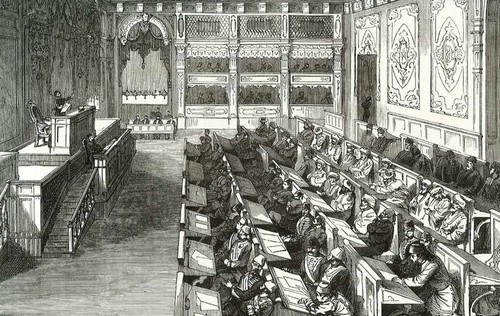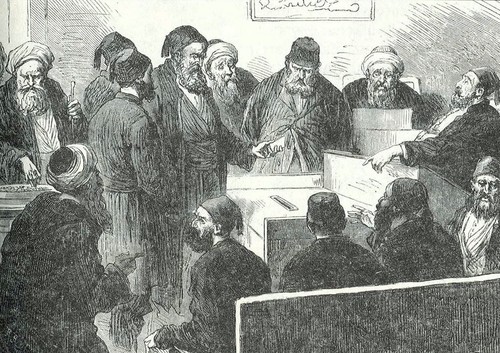© Turkuvaz Haberleşme ve Yayıncılık 2026
Turkey has entered a new election cycle. Elections reflect the people's will through ballots. Turkish citizens are protected by their right to use this power given to them two centuries ago.
Break from tradition
When the Ottoman Empire was in trouble, it was able to recover by making reforms. An example of 17th century reforms was the empire's own past, especially during the reign of Süleyman the Magnificent. However, during the same period, Europe was not setting such a shining example.
During the 18th century Tulip Revolution, the Ottoman Empire turned to the West for the first time. Developments in Europe began to be taken seriously. But in this period, Europe's path was still not without its bumps. By the end of the 18th century, Europe was the trendsetter of the world. Westernization in this period was mixed with tradition. With the reign of Sultan Mahmud II, Westernization in Turkey began in a real sense. Mahmud II's reign was a radical break from traditional Ottoman history and a period in which the classical Ottoman system completely changed. This was also influenced by the abolition of the Janissary Corps, the most important support of the opposition against the reforms, in 1826. Commander in Chief Hüsrev Pasha was the most important supporter of Sultan Mahmud and his reforms during this period.
Mukhtar elections
One of the important changes that Mahmud II brought was elections. The first elections were held during his reign that spanned from 1808 to 1839. The mukhtar organization was established during this time while the structure of the empire was getting a complete overhaul. It was also the first opportunity for the people to choose their own representatives. In fact, the lexical meaning of "mukhtar" is "elected." Mehmet Güneş's book, "Mukhtarship in the Ottoman Period," thoroughly details the history of this institution.
Ottoman administrators did everything to prevent immigration to Istanbul for centuries but were unsuccessful. Mahmud II established mukhtar organizations in Üsküdar, Eyüp and Galata in 1829 to reduce immigration to Istanbul and to ensure security and orderliness. However, the first mukhtars took office through appointments, not elections. In 1833, the first provincial mukhtar organization was established in Kastamonu's Taşköprü, outside of Istanbul. Over time, mukhtars were appointed all over the empire.

A drawing of the Ottoman parliament opened in 1877.
According to documents found by Mehmet Güneş, Bolu was the first place in the empire where provincial elections were held. After 1833, the mukhtar organization gradually spread throughout the country. After 1864, a provincial ordinance was passed in the villages where Muslims and non-Muslims lived together and each community began to choose their own mukhtar annually. The elections were limited to Ottoman men over 18 who paid at least 50 cents in taxes every year. It was also obligatory to pay a certain amount of tax in order to become a mukhtar.
Provincial councils
Sultan Mahmud's reforms completely changed the structure of the empire and were followed by the Tanzimat reforms after a document was read by Mustafa Reşid Pasha in Gülhane on Nov. 3, 1839. However, when the Tanzimat reforms were financially ineffective, a new system was set up.
The old tax system in which the state imposed taxes whenever it wanted and collected the taxes via the provincial regulators or other methods was replaced by a taxpayer institution where the representatives of local people participated. Taxpayers who had a certain amount of property and income were elected to these boards. Previously, these committees included the elders of that region, called proprietors and gentry. After the Tanzimat, representatives of the Christian community were now included in the councils. However, Muslim representatives did not want to accept their inclusion at first. There were disputes between them but in time, they got used to working together.

After the Tanzimat, bringing together elders by establishing councils in provinces and sanjaks was an important step in encouraging local participation in the administration. This was an important milestone in the process of leaving absolutism behind for constitutionalism. Members of the council came from provinces each year and reported their affairs to the Council of State, and the troubles of the villagers were discussed, as well. During his research, İlber Ortaylı focused on the first council and the experience of the provincial councils.
In 1864, the Ottoman administration issued a provincial ordinance to help solve some of the problems being faced by provincial administrations. According to the ordinance, members of the Muslim and non-Muslim provincial councils would not be elected by congregations. Candidates nominated by the provincial administration would be elected by taxpayers. With the 1871 ordinance, the system became widespread and lasted until the final years of the empire.
First Assembly
In 1876, elections officially entered our lives with the declaration of the Constitution. On March 19, 1877, the first assembly of the Ottoman Chamber of Deputies was convened. It was a colorful assembly in which deputies from all around the empire participated. The majority of the deputies had previously served as electors in the provincial councils. For the first time, Istanbul held an election. The provincial officials had more experience.
As a matter of fact, the deputies from the provincial council explained that they had been familiar with election procedures since the beginning of the Tanzimat, and that Istanbul was holding elections for the first time. "We are from the province. Of course we are more knowledgeable. We have been involved with this since the beginning of the Tanzimat. Istanbul will hold elections for the first time this year," Edirne Deputy Rasim Bey said in a session.
Month-long elections
Ottomans were first introduced to political parties in 1908 during the Second Constitutional period. The 1909 elections hosted the first competition between the Union of Progress and the Liberal Party. The people voted thanks to the freedom created by the Constitution and held the elections with great enthusiasm. On the day of the elections, the vote was celebrated with drums and zurnas, and the polls were as festive as wedding receptions. The elections lasted a few months, not only a day like now. Given the vast geography of the empire, it is hard to imagine how difficult it must have been to organize elections. From 1876 to 1946, members of Parliament were elected in two-round elections. According to that system, the first electors in the electoral districts elected the second electors, which in turn elected the deputies, meaning the parliamentarians.
